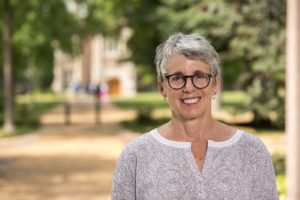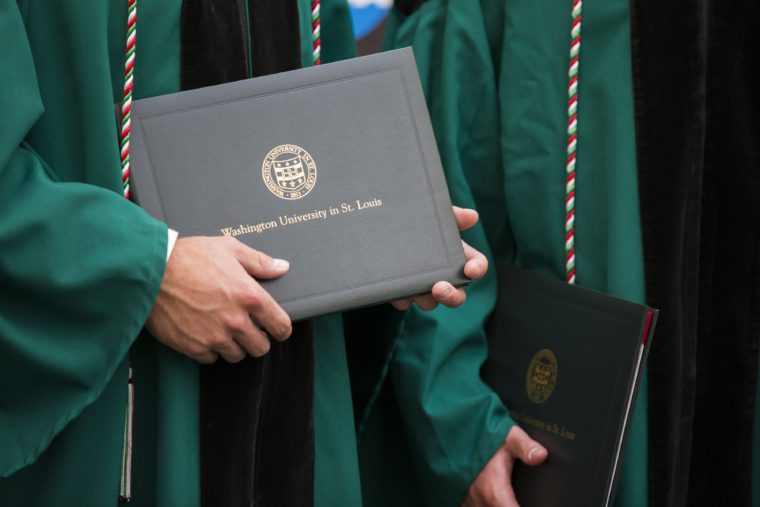Each year, roughly one-third of humanities doctoral recipients will graduate to tenure-track positions. But a recent analysis of data from The Andrew W. Mellon Foundation’s Graduate Education Survey found that those pursuing nonacademic careers actually report slightly higher levels of job satisfaction.
This raises two questions. How are doctoral programs preparing these graduates for careers outside the tenure track? And how can we better support the faculty who lead these efforts?

“One of the primary challenges we face, as faculty trying to prepare students for a range of career outcomes, is that most of us have only experienced a single career outcome: the tenure-track career at a research university,” said Jean Allman, director of the Center for the Humanities in Arts & Sciences at Washington University in St. Louis. “We don’t have the skill set we need to prepare the next generation for the job market they will face or the range of possible outcomes.”
Over the past several years, Allman, the J.H. Hexter Professor in the Humanities, has helped to lead university efforts to explore new models of doctoral education and to transform perceptions of what it means to be a humanities scholar.
This fall, the Center for the Humanities will begin putting some of those ideas into practice, thanks to a $1.5 million Mellon Foundation grant to support “Faculty for the Next Generation: Toward New Models of PhD Training in the Humanities.”
“Through the center, a group of faculty in the humanities have been working on an exciting set of initiatives in collaboration with the Career Center and the Graduate School, and have had encouraging conversations with humanities department chairs and directors of graduate studies,” said Allman, who will serve as principal investigator.
“With this generous support, we are now in a position to move from additive or incremental change to transformative change,” Allman added. “We will be able to undertake substantive faculty training, to fund robust curricular innovation and to rethink one of the foundational pillars of humanities graduate education: the three-hour, discipline-specific seminar.”
Building capacity
Support from the Mellon Foundation — which has awarded more than $15.4 million to Washington University since 1970 — builds on a series of faculty workshops and discussions that were sponsored as part of a 2016-17 National Endowment for the Humanities “Next Generation” grant.
It also builds on an extensive review of Arts & Sciences’ doctoral programs that was led by William F. Tate, dean of the Graduate School; and on doctoral training innovations already being implemented through the Humanities Digital Workshop, directed by Joe Loewenstein, and the departments of Art History & Archaeology, Classics and Comparative Literature, among others.
“We now have access to 10 years of data on admissions selectivity and yield, enrollment, attrition, funding, years to completion and employment outcomes,” Allman said. “In other words, we have launched our efforts to reimagine humanities doctoral training with a very clear sense of where we have been, where we are now, and the disciplinary commonalities and differences among us.”
The Mellon grant will enable the Center for the Humanities to begin implementing in September 2018 four key initiatives:
- Faculty retreats to explore new skills as well as new teaching strategies designed to foster career diversity;
- Curricular innovation grants to support new pedagogical initiatives and to encourage collaboration across schools, departments and disciplines, as well as with neighboring institutions;
- Cross-training for humanities faculty, which will enable faculty to undertake coursework in fields outside their own areas of expertise; and
- Creating new communities for living and learning through a pilot series of year-long, vertically integrated “studiolabs” organized around a particular theme or problem.
“The humanities studiolab draws inspiration from both the studio and laboratory as pedagogical spaces,” Allman explained. “Each studiolab will be proposed and organized by at least two Washington University faculty and will include scholar-in-residences, post-doctoral fellows and an interdisciplinary cohort of graduate students.
“This will provide opportunities to think about ‘space’ and ‘community’ as constitutive parts of graduate training, and to develop the capacities — beyond specific disciplinary skills — that we consider essential to success within and beyond academia,” Allman said. These include “competency with digital and other media; collaboration; project management; communication with many audiences, both within and beyond the university; and oral presentation.
“While the plan is ambitious, Washington University has extensive past experience with NEH seminars, Mellon Sawyer Seminars and Mellon-funded vertical seminars,” Allman said. “We are confident that open dialogue, scheduled reporting, careful monitoring and engagement with both local and external experts will effectively position us to advance a new model for doctoral training.”
